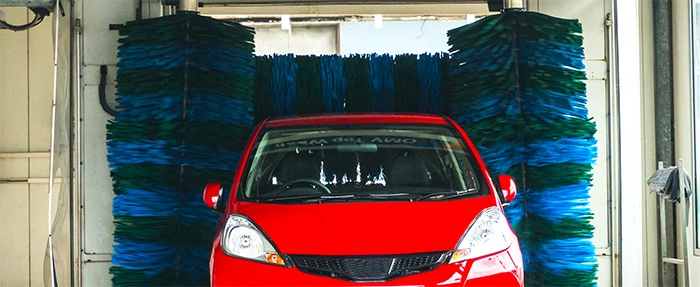Car wash myths debunked

Maybe you’ve considered going to your local automatic car wash for a “treat.” Normally, you would wash your own car in your driveway and save money, but occasionally, you think it’s fine to pay “more” just so that you don’t have to do it yourself, right? Just an occasional splurge. Not really part of your budget normally, because it’s too expensive, though – right?
Myth number 1: Car washes will damage your vehicle
This is the myth that you will hear perpetuated the most. In reality, an automatic car wash can actually be safer than washing a vehicle yourself on the driveway. Car wash equipment has developed and improved over the last ten years to create a safe and reliable cleaning experience. They are made to preserve your car’s finish.
This is in comparison to the mistakes that you can make while washing your vehicles at home.
Not using an ample supply of water to properly eliminate dirt.
Washing the car in direct sunlight, causing burn spots on the paint.
Using the incorrect type of soap, removing the vehicle’s protective wax and leaving residue right on the vehicle’s finish.
Myth number 2: A car wash wastes a lot of water
Again, not so. A typical car wash will use about the same amount of water to wash your car as you do for a bath or typical shower.
To illustrate: If you take a bath at home, you’re going to use between 115 and 190 L; if you take a shower, you’ll use up 20 L of water a minute with an old, non-efficient shower head. (You’ll use half that, 10 L, per minute with a new “low flow” shower head.)
And so, the car wash will use about 150 L of water per wash – about the same as you’re going to use for your bath or for a typical standard shower that lasts eight minutes.
Myth number 3: After-Wash wipe downs can cause scratches
Current drive-through car washes now employ heated air to remove the water after your wash. The blast of air, while warm, will not cause any damage to your vehicle. Some remaining full-service car washes offer a hand cloth wipe down afterword. This is where the myth arises. If you notice that the wash’s workers are using old or rough towels, then you should speak up and ask for a clean and fresh new towel to be used on your vehicle. If that is not satisfactory, you can just skip it all together. The drive back will air dry your car naturally.
Myth number 4: Car wash brushes are abrasive and will leave scratches
This is true of older car washes that are not maintained properly. The newer car washes use cloth that won’t leave scratches on a car’s finish. Other car washes don’t even come in contact with your vehicle. These are touchless car washes. These washes make use of high pressure water jets and special detergents to remove dirt without actually touching the vehicle. As a result, there is no chance that the car will suffer any damage.
Myth number 5: There’s no way to go waterless when you wash your car, even if you do professionally
Again, not so. Your car wash can stock the equipment and cleaning substances to clean and polish your car’s surface without using water.
There are some caveats to this: You should only do a waterless car wash if your car is lightly dirty, and you’ll need to wipe the cleaning product off the surface before it dries with light, unidirectional strokes (that go in one direction). No circular motions, in other words.
Myth number 6: Okay, waterless car washes do exist – but they’re not environmentally friendly
Not quite. It’s true that in addition to car wash equipment, there are chemicals used in waterless car washes. However, you can minimize your environmental impact based upon the cleaning product you choose. If you pick a product that is VOC compliant, that’s considered safe. (Ryko Solutions uses organic surfactants that are also free of petrochemicals.)
In addition to using safe chemicals, waterless car washes also save the environment by saving… water, of course. While an ordinary car wash session is going to use about 150 L of water to wash your car, a waterless car wash session will use none.
Myth number 7: Waterless car washes don’t get your car as clean
Fact: Your car can actually look cleaner if you decide to go waterless. That’s because the polymers used will leave a film behind that will give your car’s surface gloss and shine, and a smoothness that doesn’t happen with ordinary water-based car washes, even when quality car wash equipment is used.
This article was submitted by Ryko Solutions. They are the largest provider of managed car wash systems in North America, offering integrated end-to-end clean vehicle solutions including car wash equipment, cleaning solutions, a nationwide technical services organization and consumer marketing programs.


